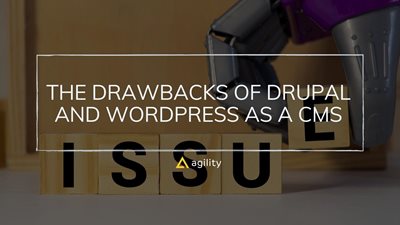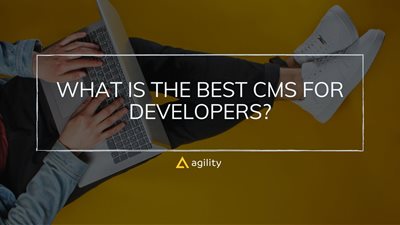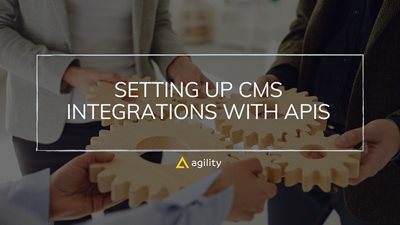The Drawbacks of Drupal and WordPress as a CMS


Regardless of how you choose to look at it, content marketing is truly "today's marketing" for various reasons. Not only does it cost approximately 62% less than traditional marketing methods, but it also generates nearly three times the volume of leads in the long term, according to one study. Over the last few years, an estimated 73% of major organizations must hire at least one person to help manage their larger content strategy.
If content marketing is about getting the right message in front of the right person at the right time, it is essential to understand that your overall strategy is only as strong as the content management system (CMS) used to build it. To save money and increase efficiency, many have turned to solutions like Drupal or WordPress in recent years to get that job done in as straightforward a manner as possible.
As always, before making any decision (especially one that will affect you on an ongoing basis), it is important to look at some possible drawbacks associated with such services. There may be more than you realize in terms of Drupal and WordPress as CMS.
Security Concerns
Perhaps the most significant drawback of using Drupal and WordPress as CMS is one of the security concerns that are inherent to an open source platform.

In terms of security, though, it leaves a bit to be desired. Any developer anywhere in the world that is even remotely familiar with the platform's code could quickly identify security vulnerabilities you may be unaware of. Especially if your site deals with sensitive or personal information, this is something you do not want. For example, if you deal with payment information on an eCommerce site, open source vulnerabilities could pose a very significant risk.
Your Development Needs
Another one of the major drawbacks of these types of solutions ultimately comes down to your long-term development needs. If you require a feature on WordPress that doesn't already exist as an add-on plugin, you'll need to hire a developer to build that. The feature may be incompatible with your current site, requiring additional integration between the two. That may require platform upgrades, making even the seemingly simple process of adding a new feature or two shockingly time-consuming and expensive.
Simply put, it's expensive to develop yourself - which means that in this situation, you may not always be able to take advantage of new features that competitors are adopting.
In terms of Drupal, the backend is notoriously complicated for less tech-savvy marketers. If you (or your developers) aren't proficient in HTML, PHP and other programming languages, you'll quickly find yourself at a serious disadvantage.
On the WordPress side, even simple operations like removing a date field often require some understanding of PHP. Key tasks (like creating custom post types) involve writing complicated technical code that you may not have the time or the ability to do. WordPress as a core solution also needs to be updated frequently, leading to issues with your existing plugins and more development needs you might not have been planning on.
The Customization Problem
Drupal and WordPress also pose a challenge for some in terms of customization. Drupal doesn't have many modules available for customization, and while there are specific free options, most of the more popular and widely-used ones require an additional fee. Upgrades are often an issue if they break one of the plugins you're already using; further development work will be required.
Plus, there is the issue that you cannot upgrade a site built with Drupal 6 to Drupal 8. If your site was created with the previous version, you're starting from scratch.
Upgrading in WordPress often isn't much better, as you're likely dealing with upgrades that cause issues with existing features, templates and other essential elements.
Support, Or a Lack Thereof
Many people don't realize that when you're working with an open source solution, one of the most immediate problems you run into is one of support. Open source programs aren't owned by anyone, meaning there isn't any company behind them. If you need development or support work, you and your staff will have to handle it. You can't pick up the phone and call someone when you get stuck. If your site goes down, it's up to you and your employees to fix the problem: period, end of the story.
Having a solid foundation of support means that if you encounter a bug or get hit with downtime, these issues will be fixed faster - if they occur. You get immediate access to the people who built the features you're experiencing issues with and know it like the back of their hands. The importance of this is something you cannot put a price on, especially when every second of downtime costs you money.
Remember that according to one study, the average hourly cost of an infrastructure failure is about $100,000. The average price of a critical application failure per hour is often between $500,000 to $1 million. Literally every second that your systems are down, you're losing money - to say nothing of the long-term damage that is being done to your reputation. Now, consider that it is up to you and you alone to get things back online as quickly as possible if this happens. Are these the types of expenses that you want to take your chances with?
Flexibility and Scalability
Finally, many often find flexibility and scalability as two major pain points when working with a solution like Drupal or WordPress as a CMS.
Neither of these solutions was built to be extended indefinitely. They're not made accessible to integrate with other important systems you may already be using. If you need to develop an API to get your CMS to interact with another solution, you will need to do it yourself, which leads to additional costs and resources.
With Drupal, if you're on the hunt for a new vendor, you'll likely be limited to only those already proficient in Drupal development. Because this niche is so specialized and their technical knowledge is so specific, this can often get very costly.
Regarding scalability, some limitations stem from the fact that neither Drupal nor WordPress were designed to be enterprise-grade solutions. Are your traffic volumes getting larger and larger as your business continues to grow and get more successful? That's terrific, but it will cause you to run into problems with your CMS. Any hosting changes that you're encountering are your responsibility to manage.
These may seem like minor issues on their own, but when you experience multiple problems with scalability and flexibility simultaneously, they can quickly add up to a massive headache and a troublesome situation that you shouldn't have found yourself in, to begin with.
In the End
One of the most important things to understand about this is that there is ultimately no "one size fits all" approach to what you're doing. Just as the content you're creating needs to remain malleable, allowing you to serve the needs of your audience better as they continue to grow and evolve, the CMS you're using conditions to do the same. There is no "right" tool for every job - only the right tool for the right job at the right moment.
For some, options like Drupal and WordPress may be the right tool for the right job. For others, they will be woefully inadequate in several critical areas. Open source solutions that operate on a code readily available to everyone on the web may get the job done for some but not others. If all the features you require already exist as add-on plugins, terrific - if not, the additional development needs may cause some of that money you thought you were saving on drying up before you realize it. Customization, support, flexibility, and scalability - are all essential criteria to look at, and only you know how a solution like Drupal or WordPress does (or does not) line up with what you need and when you need it.
To be clear, absolutely nobody says that Drupal and WordPress are "bad services." Far from it - they're trendy for a reason. It's just that when you consider what they offer in the context of the potential disadvantages, they may not be suitable for you.

About the Author
Harmonie is the Senior Marketing Manager at Agility CMS

What is the Best CMS for Developers?

Setting Up CMS Integrations With APIs

Why Marketers Need a Headless CMS
What is a Headless CMS?
The idea of Headless CMS has prompted companies to reconsider their current tech stack capabilities, but what is this tool, and how does it differentiate from systems that existed before it?
Learn More